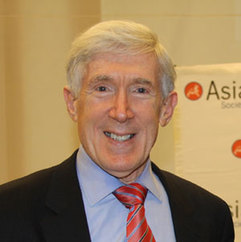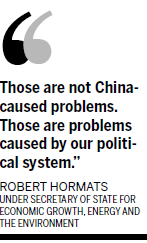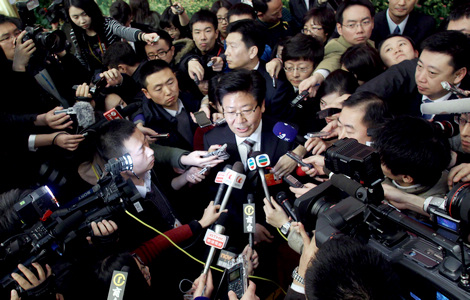 |
|
|
|
|||||||||||
"While we have real and serious issues with China, to blame China for the major problems the US faces today and to blame China as the primary cause of that is inaccurate," said Robert Hormats, under secretary of state for economic growth, energy and the environment.
 |
|
 |
"It's even worse in the sense that if you blame someone else for your problems, you won't do what you need to do at home to fix them," Hormats told China Daily on Tuesday in an exclusive interview before addressing a crowd at the New York-based Asia Society on US-China economic ties in the last 40 years.
Noting that certain US companies lost out in China due to a lack of intellectual property rights protection, Hormats said it's important for US government officials and others to make it clear to Americans that the country has to address its own problems, such as education, infrastructure, energy dependence and fiscal policy.
"Those are not China-caused problems. Those are problems caused by our political system," said Hormats, who has been a key figure in the US-China Strategic and Economic Dialogue and dealt with China since president Richard Nixon's years.
"We have to deal with those problems ourselves and those are our own problems," he said.
"If we are going to compete with China, we have to make ourselves more competitive, our workers more competitive, our education and infrastructure more competitive."
Having made at least 60 trips to China since the early 1970s, both in his government capacity and his private job as vice-chairman of Goldman Sachs (International), Hormats believes the US has to learn from China in several areas.
He said the US should take a long-term view to make it more competitive five years from now, citing the example of infrastructure investment in China and the deteriorating facilities in the US.
He also praised China's emphasis on education and interest in learning foreign languages as building intellectual infrastructure for the 21st century. "Those are the things we should learn from China," he said.
Hormats said China's fast growth has benefited the US and the rest of the world, but cautioned that some of the practices China used to become a strong economy are harmful to certain companies and workers. He believes that will be a problem in the future in areas such as intellectual property rights, having a level playing field and the exchange rate.
However, he also pointed out that China is acting in some ways to improve intellectual property rights protection.
Regarding State-owned enterprises, Hormats believes the bigger issues for the US are some techniques used by China to support those SOEs and innovation, or to force foreign companies to transfer technology.
He believes the World Bank's China 2030 report, which also lists government subsidies for SOEs as an issue, is going to trigger a lot of debate in China.
Hormats praised former Chinese leader Deng Xiaoping for opening up China and former premier Zhu Rongji for leading China into the World Trade Organization, which benefits China both internally and externally. He believes that more integration into the international economic system will further benefit China.
Acknowledging many of the positive things in China's 12th Five-Year Plan (2011-15) and Premier Wen Jiabao's Government Work Report delivered to the National People's Congress this week, Hormats said the US would like to see more progress on intellectual property rights and other issues, citing establishing the Trade Enforcement Unit as a result of not making progress on some of the issues.
"We are not expecting overnight change in China, but (we expect) change in the right direction," he said.
Hormats said cooperation and competition are integral parts of the economic ties between the two countries. "It won't change. It was the way for the last 40 years, and it will be the relationship for the next 40 years," he said.
"Of course we made a lot of progress in the last 40 years. If we do it right, we'll make great progress for the next 40 years," he said.
You may contact the writer at chenweihua@chinadailyusa.com
Wu Ying, iPad, Jeremy Lin, Valentine's Day, Real Name, Whitney Houston, Syria,Iranian issue, Sanyan tourism, Giving birth in Hong Kong, Cadmium spill, housing policy

|

|

|

|

|

|